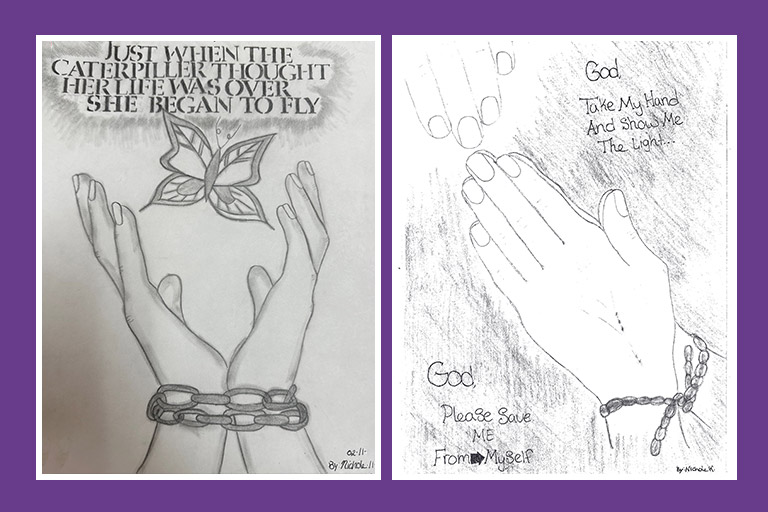From Trials And Transformation: A Gritty Account Of Triumph Over Addiction

Rude Awakening
“Don’t move your arm. Your needle is broken, and we think part of it is still in your arm,” Nikki recalls hearing as she was lifted into the ambulance. “We are going to start an IV, and don’t say you are afraid of needles.”
These are the first memories she holds of coming around after Narcan had to be administered to revive her. Back from what could have been her final overdose had she not been at her brother’s house, Nikki also remembers being told that her brother was in the backyard sobbing.
“It hurts thinking about my family seeing this,” Nikki says with tears streaming down her face. “My family wanted my sobriety more than I wanted it for myself. Once when my mother explained that ‘she had to love me at a distance’ because of my addiction, I remember feeling abandoned. But I now understand that I have to regain my self-worth in order to again feel the joy that I know recovery can bring.”
The road to this last epiphany has been winding. It’s not the first time Nikki has sought recovery. And, like so many others afflicted with the chronic disease of addiction, long-term recovery is something that is tied to each person’s ability to regain their self-esteem, resolve their psychological issues, receive appropriate treatment, and continue to seek the many support opportunities that help them find the inner strength to find happiness.
Childhood Memories
Her memories of being challenged begin at the age of four when her single mother of three met a man with four children. After one week, they moved in with him. Now, the seven children lived together in a two-bedroom house where the basement and the attic had to serve as bedrooms. This man turned out to be an abusive alcoholic who, over the course of Nikki’s life, her mother would marry and divorce four times.
She remembers starting kindergarten and then being pulled out and sent back to preschool. While she recalls being very social, she also remembers being very depressed as a child. “While we did have some good times, I remember many times where I would sit in a laundry basket while playing elevator music and crying,” she said.
And So It Begins
By the age of 13, she started smoking marijuana, drinking, and huffing. She recalls struggling in school even with an Individual Education Program (IEP), so she made the decision to drop out of school in 8th grade. By the age of 15, she lost her virginity to a 30-year-old man in exchange for drugs and alcohol. By the age of 17, she started using heroin.
“My stepdad said his marriage suffered because of us kids, so he kicked us out of the house on weekends,” she said. “I used the allowance they gave us to buy my drugs.” Then at 19, she got her first job and her own apartment in Orrville.
“I was shooting up in the bathroom at work but still doing my job. But then when my stepsister couldn’t get our regular painkiller drugs, she came with this new drug telling me to be careful and to not do it all at once. Turned out it was Methamphetamine (Meth) which gave me more energy than I had ever had. Meth became my drug of choice.”
But when she blacked out at work, they asked her to take a drug test. Since she told them she wouldn’t test clean, they made her test, but told her since she was honest with them, they would help her get treatment. When a bed at the treatment facility wasn’t available, she quit her job and took to the streets with no money and no home.
Returning to her family home, her stepfather became her supplier. But it was her mother’s sister who asked her to spend the weekend with her that changed her life for the first time.

Introduction To Recovery
“When I got to my aunt’s house, she told me I wasn’t going back home,” Nikki said. “That’s when I was introduced to OneEighty. I began with the agency’s intensive out-patient program, and then I went into the women’s residential treatment facility, and something clicked for me. I saw that there was a different way of living.”
She recalls that she grew a lot during this time, feeling supported by everyone around her. She spent one year in the treatment program, one year in the transition program, and was able to stay clean, have her own apartment, and successfully hold a job for some 3 years.
“That place saved my life,” she said. But after 3 years clean, I made yet another bad choice. I left a job I loved and went back to my old ways of using Heroin and Meth.”
Cycle Repeats Itself
This cycle would repeat itself multiple times. Each time, a new relationship including one marriage would lead to her downfall. One of her partners would use and pass out or overdose almost every day. The woman she married had children and while encouraging her to get and stay clean, was herself not clean.
“I eventually found Fentanyl (Fetty), and during one of my stays at the woman’s shelter, I almost overdosed. I was so embarrassed that I did that in an environment that had once before saved my life,” she said. “Later when I sought out the 7-day detox program at St. Thomas, I completed it and got high the next day.”
With nowhere to go, her brother took her in. As much as he wanted to help her get and stay clean, she had gone back to hanging out with her old friends. It was the day before she was to go into yet another detox program that she overdosed while sitting on the toilet at her brother’s home.
Make This Time Last
Now at OneEighty’s Women’s Residential Treatment Center (WRTC), Nikki reflects on her journey. When asked what she would say to someone who says, ‘she made her choice, why keep pulling these people back from the brink?’ she takes a very long pause. “That’s a tough one to answer. This time I want to be here. It hurts thinking about my family having to witness what I have been through. My brother and his daughter saw me turn blue and almost die. I have to fix this. I want to lead a normal life, but I recognize I am not ‘normal.’ I have a disease that I have to continue to treat on a daily basis. That’s all there is.”
OneEighty Resources
For those encountering a substance use crisis please call OneEighty’s Substance Use Crisis Hotline available 24 hours per day, 365 days per year at 330-466-0678. For other resources, click the links below:
Community Relations & Prevention
Substance Use Treatment Navigator Hotline
Intimate Partner & Domestic Violence booklet (Wayne County)
Self-Help Legal Manual
Follow us on Facebook, Instagram, and LinkedIn.
OneEighty Resources
For those encountering a substance use crisis, please call OneEighty’s Substance Use Crisis hotline, available 24 hours per day, 365 days per year, at 330-466-0678. For other resources, click the links below:
